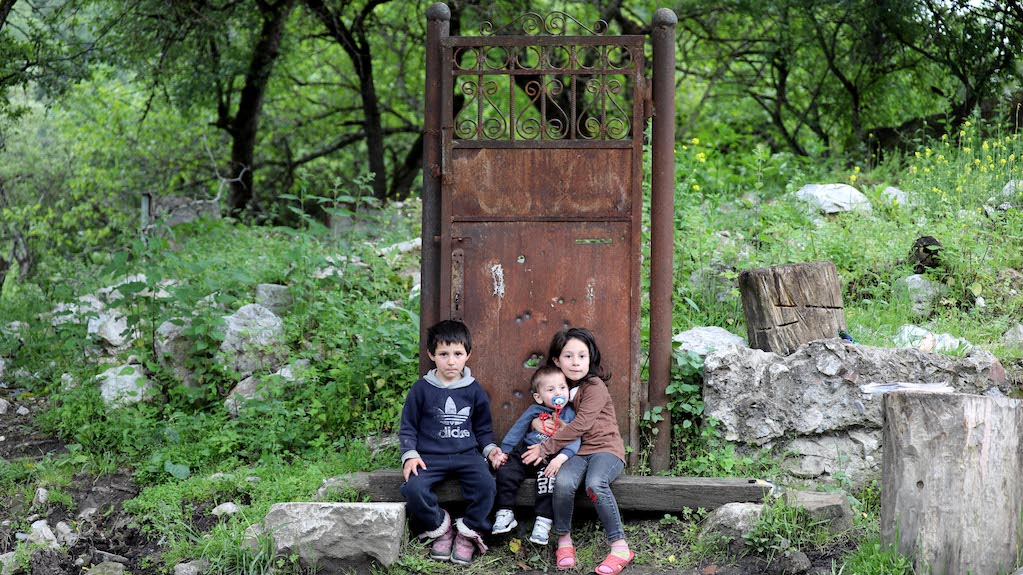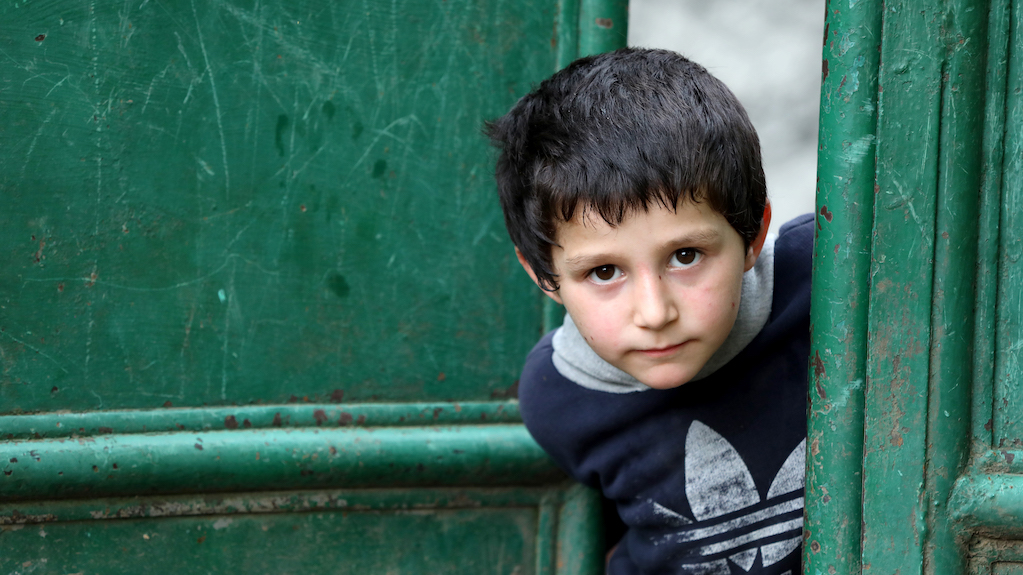Maisuradze is the fourth most common surname in Georgia. In the place of origin of this surname, in the village of Tsedisi in Racha, the Maisuradze family is the only remaining one with children. Because the family has no other place to live, Anastasia Maisuradze turned 6 without receiving a preschool education. Anastasia has two younger brothers – 5-year-old Giorgi and 1-year-old Nikoloz.
News
Now, in order for Giorgi to be able to receive preschool education, the Center of Civil Activities is filing a lawsuit requesting the opening of a kindergarten in the village of Tsedisi for a single child.
Tsedisi is 16 kilometers away from Oni, near the Russian-occupied region of Tskhinvali. After the Russo-Georgian War of 2008, the people of Tsedisi have no longer been able to use tens of hectares of mowing pastures belonging to the village. Not a year after the war, Russian occupiers tied father and son Abesalom and Mate Maisuradzes to a tree in Tsedisi meadows and took away their bulls.
Fear after the war was one of the reasons for the fleeing of mostly the young from the village. 163 people lived in Tsedisi in 2022, and by 2014, the number was down to just 53. Between the counts, in a span of 12 years, the population reduced to a third. By now, the number is even lower, with just about 20 people remaining in the winter months. One family with two young children left the village precisely because of the lack of a kindergarten and school. Tsedisi is not an exception. In 49 villages of the Oni region there are no more children under the age of 6, and one of the reasons, along with the lack of employment, is the lack of access to education services.
Mate Maisuradze also considered leaving Tsedisi to give his children access to education, but couldn’t. The family is socially vulnerable. The nearest kindergarten from Tsedisi is in the city of Oni, and they were going to rent an apartment there. A car that performs the function of public transport departs from the regional center once every two weeks. Moving to Oni meant further impoverishment for the family. In Tsedisi, they care for a few livestock and grow potatoes.
We can’t open a kindergarten for one child – has been the response of the local government to the parent’s requests that their children also be given access to preschool education.
On April 5, the Center of Civil Activities addressed a letter to the Oni City Hall requesting the provision of preschool education and care for the children of Tsedisi, Ghebi, and Sori villages. There are five children in Ghebi and four in Sori without access to a kindergarten.
There are just two kindergartens in the Oni region as a whole, one in Oni city, and another in Glola. Like in Tsedisi’s case, neither is accessible to the children of Sori and Ghebi.
Ghebi village is 35 kilometers away from Oni. The round trip is 70 kilometers. It is very difficult for preschool children to travel such distance every day, even if the municipality provided transportation.
As for Sori, the distance from the village to the regional center is 14 kilometers. Because Sori is a roadside village spanning alongside the Ambrolauri-Oni highway, unlike Ghebi and Tsedisi, it is less affected by extreme climate conditions, heavy snowfalls, and road closures, and parents believe that it is possible for their children to receive preschool education in Oni kindergarten, given that the municipality provides transportation.

According to the statement of the First Deputy Mayor of Oni, Giorgi Nodarishvili, for the 2023-2024 school year, school readiness centers will be opened in all villages of the municipality with preschool-aged children and no kindergartens. A school readiness center is not the same as a kindergarten. They accept children from age 5 and hold lessons for several hours a day.
According to the City Hall, the construction of a kindergarten meant for 50 children will begin this year in the village of Ghari, Oni municipality.
It is unclear what justifies the construction of a 50-child kindergarten in Ghari (for the contract price of 1,291,246 GEL) when there are 6 children under the age of two and 3 children of preschool age in the village.
The City Hall cannot specify what studies and/or data this decision was based on and for what reason was the kindergarten designed for 50 children, when this resource could have been used to provide preschool education to the children in other villages (Ghebi, Sori, Tsedisi).
“The fact that children in these three villages of Racha are not given access to preschool education constitutes their discrimination based on their place of residence and geographical accessibility, which is unacceptable,” says Vladimer Kutateladze, a lawyer of the Center of Civil Activities.
The legislation assigns the responsibility for the provision of preschool education to municipalities and does not specify how many children must live in a village to mandate the opening of a kindergarten. Receiving preschool education is a basic constitutional right and should be universally accessible to all children. Additionally, by the law “On Early and Preschool Education”, kindergarten children must be provided with free meals, which should meet the standards necessary for a child’s development.
This is not the first lawsuit demanding the fulfillment of the obligation to open kindergartens that the Center of Civil Activities has filed in court this year, but it is the first time that the organization started a lawsuit to realize the right to preschool education for a single child living in a highland village.
The non-governmental organization also disputed with the Dmanisi Municipal Hall for non-consideration of petitions, with which the populations of Amamlo and Irganchai villages were requesting the opening of kindergartens. The Center of Civil Activities withdrew the lawsuit only after the Dmanisi Council presented documents at the session, proving that they announced a contract for the construction of kindergartens in both villages and allocated 7 million GEL from the state budget. Kindergartens with 125 child capacity will be built in both villages. The Center of Civil Activities filed a lawsuit in Sachkhere Regional Court as well, demanding the construction of kindergartens in villages Vachevi and Zeda Chalovani of Chiatura.
At the end of last year, the Center of Civil Activities submitted 16 petitions to 11 municipal councils with a request to construct and ensure the functioning of kindergartens. In 9 out of 11 municipalities (Akhalkalaki, Tsalka, Dmanisi, Sagarejo, Borjomi, Sachkhere, Chiatura, Tsageri, Aspindza) the petition mechanism was used for the first time, despite the fact that the petition as a form of citizens' participation in self-governance was defined by the Local Self-Government Code 7 years ago.
During a government session near the end of 2022, Prime Minister Irakli Garibashvili announced the launch of a new governmental program for the construction and rehabilitation of kindergartens.
The Municipal Development Fund announced contracts and allocated around 25 million GEL for the construction of kindergartens in the villages of Borjomi, Tkibuli, Dmanisi, Tsalks, and Sagarejo municipalities, which petitioned for the opening of kindergartens.















